2019.08.20
After working on the different global stages, I arrived at the idea: “I want to help people who are facing difficulties” at the grassroots level
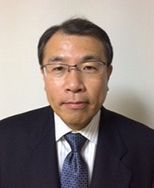
- Yoshiteru Tsuji
- Section Chief, Disaster Prevention Affairs, Rescue and Welfare Department, Operations Sector, Japanese Red Cross Society
Graduated in 1992 from the Department of Law, the Faculty of Law
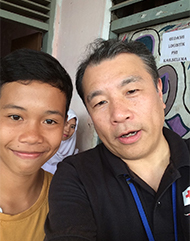
Commemorative photo when teaching the importance of disaster prevention to a young Red Cross volunteer in Indonesia, January 2018
I was a university student, when the (first) Gulf War broke out in January 1991 and the Kurds in Iraqi territory were plunged into a humanitarian crisis. Besides attending classes, I worked for various part-time jobs, including tutoring, to supplement the small allowance sent from my family.
At that time, I learned on TV about the activities of Japanese people on the global stages, such as Sadako Ogata, then UN High Commissioner for Refugees, and Yasushi Akashi, then head of UN PKO in Cambodia. Since then, I began to think that in the future, I would like to work on the global stage as a Japanese, and I put a lot of effort into self-study, such as listening to NHK radio English programs, and into foreign books reading classes to improve my English skills.
After graduating from Chuo, I worked for a development cooperation agency (JICA) and a humanitarian assistance agency (UNHCR). Through these activities, I developed a strong desire to “help people facing difficulties” at the grassroots level. Then I came across the Japanese Red Cross Society, which has a global network and community-based humanitarian activities.
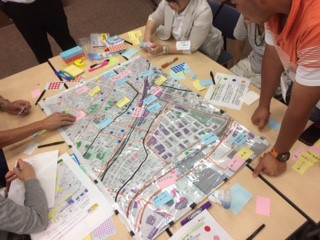
Creating a local hazard map at the Red Cross disaster prevention seminar in Osaka, early August 2019
From April 2019, 10 years after I joined the Japanese Red Cross Society, I engage in promoting the importance of “proactive preparedness” for disasters among the general public, and organize disaster prevention education seminars (known as Red Cross disaster prevention seminars) nationwide.
Since the Great East Japan Earthquake of 2011, the Japanese archipelago is said to have entered a period of seismic activity, and there is a more than 70% chance that a major earthquake, such as a Nankai Trough earthquake or an earthquake directly under the capital, will occur within the next 30 years. In order to respond to such situations, we are expanding nationwide “self-help” activities to prepare ourselves before a disaster strikes as well as “mutual help” activities to prepare in cooperation with local residents.
My current work is directly related to “saving lives.” This offers me a great challenge.
Working globally and the skills you need
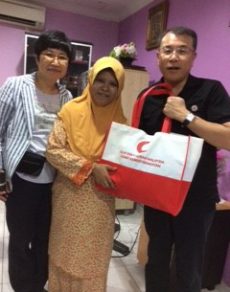
Visit to orphanage in Malaysia. Presentation of commemorative gift to staff (center)
When working overseas, I think it is necessary to be able to speak out your opinion and assert Japan’s diplomatic position while respecting the culture and customs of others in a multinational and multicultural society. For me, “working globally” means working on global issues in a multinational team while maintaining such an attitude. I think there are two skills necessary to engage in global work: the “language skills” to be able to communicate your intentions clearly; and a correct historical understanding of your own country.
First, language skills, especially English skills, are essential. No need to say but it is English, not Japanese, that is the basic means of communication with non-Japanese people in Europe, the US, and Asian countries. You do not need to put emphasis on speaking fluent English, and even if you are not fluent, if you talk with substance, people will listen to you seriously. Advanced English writing skills are also essential for students who want to work for a global organization in the future.
In order to have a meaningful conversation, you need to be able to explain Japan, your own country, to others. While it is important to understand where current Japan stands diplomatically, it is more important to have a solid understanding of Japanese history, especially its modern history. In foreign countries, people often ask why Japan developed so rapidly since the end of World War II. It is because of the tireless efforts of the predecessors to build a modern country, especially after the Meiji Restoration.
On the other hand, before the war, Japan had a period of colonial rule over Taiwan and the Korean Peninsula, and during the Pacific War, Japan forced people in the Asia-Pacific region, which was the battlefield, to suffer from severe hardships. I would like you to have a humble attitude and correct historical understanding of the fact that we live in today after going through such a past history.
Message to Chuo students
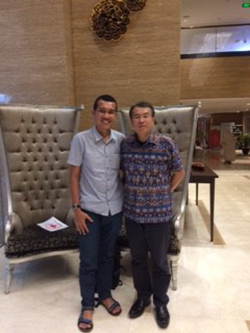
With an Indonesian colleague (left) in Indonesia, January 2018
Four years in university past surprisingly short. I recommend that you focus on your studies (classes and seminars), which is your main responsibility. In addition, studying abroad even for a short term would change your perspective. You will be able to understand Japan better by knowing other countries.
Things I’m glad I did when I was a student, and things I still continue
One of the things I’m glad I did when I was a student is that I continued to study English steadily, which made me who I am today, and I was able to work for a UN agency in the past. Also, experiencing various part-time jobs helped me learn about how it is like to work in the real world.
It is also important to firmly decide what you want to do and not waver when choosing or finding a job. I changed jobs many times, but I always have a strong desire to help people who are facing difficulties, and I am consistently engaged in work that allows me to realize my desire.
And in the future, I would like to become a more professional in the field of disaster prevention and mitigation to save as many people as possible from natural disasters. In order to do so, I believe that I must work hard to carry out the duties currently assigned to me.
Profile
Yoshiteru Tsuji
Born in Osaka in 1968, graduated from the Faculty of Law, Chuo University in 1992 Graduation seminar: “International Law Seminar” Professor Hirokazu Miyano (then associate professor)
Job history 1. Japan Overseas Cooperation Volunteer (Micronesia), 2. JICA staff (fixed term, Tokyo), 3. UNHCR (United Nations High Commissioner for Refugees) staff (fixed term, Iraq and Malaysia), 4. Ministry of Foreign Affairs staff (fixed term, Tokyo), 5. Japanese Red Cross Society staff
